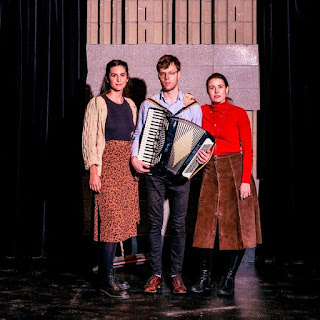Opera Review: A bracing, updated, spooky Der Freischutz
Der Freischütz
Music by Weber Carl Maria von Weber
Libretto by Friedrich Kind
Directed by Louisa Proske and Chloe Treat
Music arranged and conducted by Danial Schlosberg
Heartbeat Opera
The Rose Nagelberg Theater, Baruch College, Manhattan
December 13, 2019
In music history, Weber’s 1821 opera Der Freischütz
(The Free Shooter) has a curious history. It is considered a fundamental and
influential opera, inspiring Wagner to go into his world of special effects music later in the century. Some consider it the first great German opera. Yet, other than the overture, it is rarely done
in the US. After this very creative production by the local NY company
Heartbeat Opera, I am puzzled why this is. The production evolved all the
fantasy, magic, and spooky affect that is always talked about when reading
about the opera. It just took a young creative team (below) to brush away some cobwebs and
make it a great experience.
The opera stems from central European folklore, but has no
American roots, perhaps explaining the tough sell here. It tells the story of young
man Max who, in order to win the hand of his beloved Agathe, must win the local
shooting contest by hitting a target with one shot of his rifle. He is insecure
about this, so goes with his friend Kaspar to the spooky Wolf’s Glen at midnight
to cast seven magic bullets, provided by the devil as it turns out. Max has a
secondary agenda—the devil has agreed to grant him three more years of life if
he can deliver another vassal (Max) to his control. So this is a variant on the
Faust legend of selling your soul for gain. At the end, Max shoots, but the bullet
mistakenly hits Agathe, whose life is miraculously saved as the bullet is mystically
deflected to hit Kaspar instead, killing him. The original opera’s ending is a
bit prolonged and garbled by the influence of a new character, the hermit, who
is key in the miracle resolution. The opera is most famed for a couple of big arias
that presage Wagner, and by the spookily atmospheric, lushly orchestrated Wolf’s
Glen music.
The Heartbeat Opera resets the story to the US rural south (Texas?),
and kept the arias in German, with the extensive spoken text in English. There
was variable success in southern accents, but an appropriate good-old-boy setting
of American flags and beer cans set in the outdoor bar that replaced the German
countryside inn of the original. All the emphasis on guns, bullets, and shooting
worked well in this transposition. Not all of the cast managed successful spoken
southern accents, though. The arias were beautifully done, especially the two
big ones by the Agathe, Katherine Whyte. I loved music director Daniel
Schlosberg’s reduction of the big orchestra to six players: violin, viola,
cello, horn, woodwind (clarinets, flute), and percussion, plus an accordion and a big, fancy
electronic synthesizer upon which Mr. Schlosberg achieved numerous cool sci-fi special
effects in the Wolf’s Glen scene (btw, called “Wolf Canyon” in our Texas
version) as the bullets are cast. Somehow, the mix of traditional and
electronic worked just right. I loved that the devil was portrayed throughout by
a Butoh dancer clad in spooky wafting fabric—she/he appeared not just during scenes
explicitly written for the devil in the libretto, but as a sort of an evil side
of Max’ subconscious personality. Somehow, this fit right in with the southern
accents and all the shooting. The production was involving, with the choir and
soloists emerging at times from balconies, even from among the audience. This
was handled very judiciously by the directors so as not to become a confusing farrago.
After my recent experiences with leaden grand opera at the
Metropolitan, experiences like this bracing Der Freischütz give me hope
for opera. Maybe its time to turn it over to the young, less encumbered by notions
of what is or is not performable, and what can and cannot be done in
performance. I look forward to the next Heartbeat Opera performance.


Comments
Post a Comment